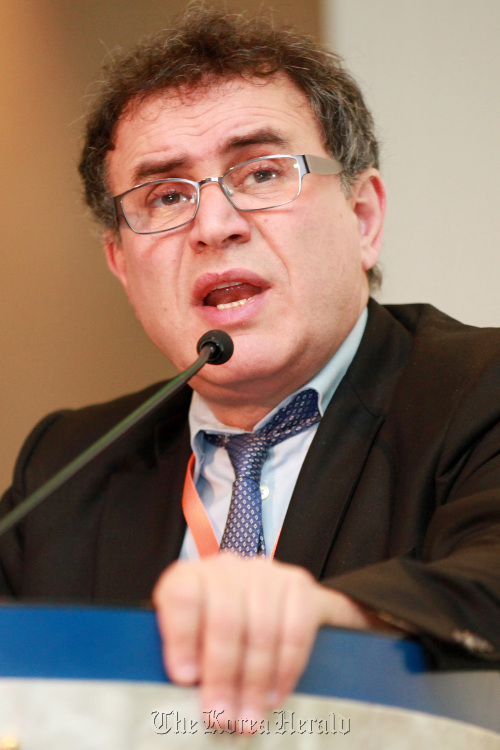Nouriel Roubini, the economist who predicted the global financial crisis, said an increase in oil prices to $140 a barrel will cause some advanced economies to slide back into recession.
Underlying how fragile the global economic recovery is, Roubini said the European Central Bank may be making a mistake by raising interest rates “too soon” when debt-ridden countries on the euro region’s periphery struggle to restore the competitiveness of exports.
“If you had the oil price going up to where it was in the summer of 2008, at $140 a barrel, at that point some of the advanced economies will start to double dip,” he told reporters in Dubai Tuesday. “In the U.S., where growth is accelerating fast, a 15 to 20 percent increase in oil prices, there won’t be double dip, but growth reaching a stalled speed again.”
Popular revolts sweeping the Middle East and North Africa, home to more than half of the world’s proven oil reserves, have pushed Brent crude-oil prices close to $120. Goldman Sachs Group Inc. raised its forecast for Brent crude in the second quarter of the year to $105 a barrel amid fighting in Libya between Muammar Qaddafi and rebels seeking to end his four-decade rule.
Crude for April delivery fell as much as $2.11 to $103.33 a barrel in electronic trading on the New York Mercantile Exchange, and was at $105 at 5:19 p.m. in Dubai. Monday, the contract settled at $105.44, the highest since Sept. 26, 2008. Prices are up 27 percent from a year ago.
In January, the International Monetary Fund revised its forecast for global economic growth this year to 4.4 percent from an earlier estimate of 4.2 percent, reflecting stronger U.S. output based on tax-cut extensions, while emerging nations lead the recovery.
Oil prices at their current levels probably won’t lead to a “significant” acceleration in inflation in advanced economies because they are recovering from a “severe recession” and still face high unemployment, Roubini, 52, told a conference on hedge funds in the Persian Gulf emirate earlier Tuesday.
 |
Nouriel Roubini. (Bloomberg) |
“Workers don’t have much wage-bargaining power,” he said.
Joblessness in the U.S. unexpectedly dropped to 8.9 percent in February, according to a March 4 report from the Labor Department. The rate fell for a third straight month to the lowest level in almost two years as employers boosted payrolls by 192,000 amid growing confidence in the expansion.
The U.S. economy grew at a 2.8 percent annual rate in the fourth quarter, up from 2.6 percent in the previous three months, according to figures from the Commerce Department.
(Bloomberg)








